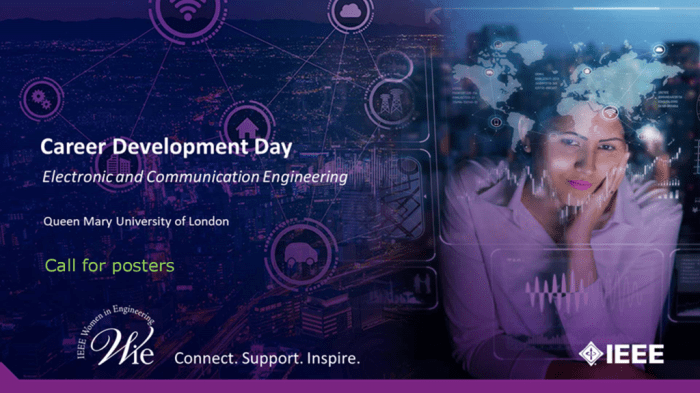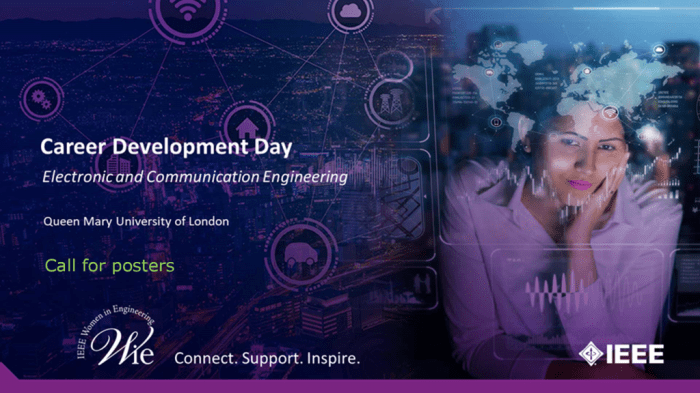
Women in Tech Career Development: A Guide to Success
Women in tech career development is a topic that’s gaining increasing attention, and for good reason. The tech industry has historically been dominated by men, but in recent years, there’s been a growing movement to encourage more women to enter and thrive in these fields.
This shift is crucial not only for achieving gender equality but also for fostering innovation and diversity within the industry.
This article will delve into the challenges women face in tech careers, explore strategies for navigating these challenges, and discuss the importance of diversity and inclusion in the tech workplace. We’ll also examine the role of education and mentorship in supporting women’s career growth and highlight emerging trends and opportunities for women in tech.
The Gender Gap in Tech

The tech industry, despite its rapid growth and innovation, has a persistent problem: the underrepresentation of women. This gender gap is a complex issue with historical roots and ongoing challenges that affect both individual opportunities and the overall progress of the field.
Historical and Current State of the Gender Gap
The underrepresentation of women in tech is not a new phenomenon. Historically, women were largely excluded from STEM fields, facing societal expectations and limited access to education and resources. While progress has been made in recent decades, the gender gap persists.
- In the United States, women hold only 28% of computing jobs, according to the National Center for Women & Information Technology (NCWIT).
- Globally, the International Telecommunication Union (ITU) reports that only 3% of women worldwide work in ICT-related jobs.
- In specific roles, the gap is even more pronounced. For example, women represent only 12% of software engineers and 16% of data scientists, according to the National Girls Collaborative Project.
Factors Contributing to the Gender Gap
The gender gap in tech is a result of a complex interplay of factors, including:
- Societal Expectations and Stereotypes:From a young age, girls are often discouraged from pursuing STEM fields, with societal expectations steering them towards traditionally feminine roles. This is reinforced by stereotypes that portray tech as a male-dominated field.
- Lack of Role Models and Mentorship:The absence of visible female role models in tech can make it difficult for young girls to envision themselves in these roles. Furthermore, a lack of mentorship and support networks can hinder women’s career advancement in tech.
- Unconscious Bias and Discrimination:Unconscious biases can lead to hiring and promotion decisions that favor men over women, even if they are equally qualified. This can create a hostile work environment for women, making it harder for them to succeed.
- Lack of Diversity and Inclusion Initiatives:Many tech companies lack comprehensive diversity and inclusion programs that actively recruit, retain, and promote women. This creates a culture that can be unwelcoming to women, leading to higher attrition rates.
Impact of the Gender Gap
The gender gap in tech has a significant impact on the industry’s innovation, creativity, and economic growth.
- Limited Perspectives:A lack of diverse perspectives in tech can lead to products and services that are not inclusive or responsive to the needs of all users.
- Missed Opportunities:The industry is missing out on the talents and contributions of half the population. This limits the potential for innovation and economic growth.
- Lack of Representation:The underrepresentation of women in tech leadership roles perpetuates a culture that is not conducive to women’s advancement.
Challenges Faced by Women in Tech

The tech industry, while innovative and dynamic, presents unique challenges for women, impacting their career progression and retention. These challenges range from subtle biases to overt discrimination, often creating an environment that can be difficult to navigate. This section will delve into some of the key challenges faced by women in tech and their impact on their careers.
Women in tech often face unique challenges in career development, and finding creative outlets can be essential for maintaining balance and fostering personal growth. One way I’ve found to unwind and tap into my creative side is by experimenting with natural dyes , a process that’s both fascinating and rewarding.
The same curiosity and drive for innovation that fuels my tech career translates beautifully to this artistic pursuit, reminding me that exploration and learning are vital at every stage of life, both professionally and personally.
Discrimination and Bias
Discrimination and bias in the tech industry manifest in various forms, impacting women’s opportunities and advancement.
- Hiring and Promotion Bias:Studies have shown that women are less likely to be hired or promoted in tech roles compared to their male counterparts, even with similar qualifications. This bias can be subtle, such as unconscious biases held by hiring managers, or overt, such as explicit discrimination based on gender.
- Pay Gap:Women in tech often face a significant pay gap compared to men in similar roles. This gap can be attributed to various factors, including gender-based pay discrimination, lack of negotiation skills, and the underrepresentation of women in leadership positions.
- Lack of Representation in Leadership:The tech industry has a long history of male dominance in leadership roles. This lack of female representation can create a hostile environment for women, making it difficult for them to advance their careers and gain recognition for their contributions.
Lack of Mentorship and Support
Women in tech often struggle to find mentors and sponsors who can guide them through their careers.
- Limited Access to Mentorship:Women may have fewer opportunities to connect with experienced professionals who can provide guidance and support. This can lead to feelings of isolation and a lack of direction in their careers.
- Lack of Sponsorship:Sponsorship is crucial for career advancement, as it involves senior leaders advocating for women’s promotions and opportunities. Women often lack access to sponsors who are willing to champion their careers.
Imposter Syndrome
Imposter syndrome is a common phenomenon among women in tech, characterized by feelings of inadequacy and self-doubt, despite evidence of success.
- Internalized Stereotypes:Women may internalize societal stereotypes about women in tech, leading them to question their abilities and skills. This can result in a lack of confidence and a reluctance to take on challenging roles.
- Fear of Judgment:Women in tech may feel pressure to conform to certain expectations and avoid making mistakes, which can hinder their willingness to take risks and learn from their experiences.
Strategies for Career Development

Navigating a career in tech as a woman can be both rewarding and challenging. This guide provides strategies to help you build a fulfilling and successful career. It covers essential aspects, including networking, mentorship, skill development, and self-advocacy, to empower you to reach your full potential.
Networking and Building Connections
Networking is crucial for career growth in tech. It allows you to connect with professionals in your field, learn about new opportunities, and gain valuable insights.
Women in tech are often encouraged to be strong and resilient, but sometimes it’s okay to embrace a bit of fluffiness. That’s where a pom pom blanket diy comes in! Crafting something soft and cozy can be a great way to de-stress after a long day of coding, reminding us that self-care is just as important as career development.
And who knows, maybe the creativity you unleash while making your blanket will spark a new idea for your next tech project!
- Attend industry events and conferences:Participate in conferences, meetups, and workshops to connect with other professionals, learn about new technologies, and build your network.
- Join online communities and forums:Participate in online forums, social media groups, and professional networking platforms like LinkedIn to connect with professionals and stay informed about industry trends.
- Reach out to mentors and potential connections:Don’t be afraid to reach out to individuals you admire or whose work interests you. Request informational interviews or coffee chats to learn about their experiences and gain valuable insights.
- Volunteer or participate in community initiatives:Contributing to open-source projects, volunteering for tech organizations, or participating in hackathons allows you to network with like-minded individuals and gain practical experience.
Seeking Mentorship and Support
Having a mentor can provide invaluable guidance and support throughout your career journey.
- Identify potential mentors:Look for mentors who have experience in your field or who are working in roles you aspire to achieve.
- Reach out and request mentorship:Express your interest in their expertise and seek guidance on career development, technical skills, and navigating industry challenges.
- Join mentorship programs:Many organizations offer mentorship programs that connect women in tech with experienced professionals for guidance and support.
- Seek out support groups:Connect with other women in tech through support groups, online communities, or professional organizations to share experiences, build connections, and gain a sense of belonging.
Developing Technical Skills and Staying Relevant
The tech industry is constantly evolving, so it’s essential to continuously develop your skills and stay up-to-date with emerging technologies.
Navigating the tech world can be a challenging journey for women, especially when it comes to finding mentorship and support. But resources like the gamesbeat op games profile can offer valuable insights into the industry, highlighting success stories and paving the way for future generations of women in tech to thrive.
- Identify areas for skill development:Assess your current skill set and identify areas where you can enhance your knowledge and expertise.
- Take online courses and certifications:Platforms like Coursera, edX, and Udemy offer a wide range of courses and certifications in various tech domains.
- Participate in hackathons and coding challenges:Engaging in these events allows you to test your skills, learn new technologies, and showcase your abilities to potential employers.
- Read industry blogs and publications:Stay informed about industry trends, emerging technologies, and best practices by following reputable blogs, publications, and online resources.
Advocating for Themselves and Their Ideas
Women in tech often face challenges in advocating for themselves and their ideas.
- Build confidence and self-awareness:Develop your self-confidence and learn to articulate your skills, experiences, and contributions effectively.
- Practice effective communication:Learn to communicate your ideas clearly, concisely, and persuasively.
- Seek feedback and learn from critiques:Don’t be afraid to ask for feedback on your work and learn from constructive criticism to improve your performance.
- Network with allies and supporters:Build relationships with colleagues, mentors, and sponsors who believe in your abilities and can advocate for your career growth.
Importance of Diversity and Inclusion: Women In Tech Career Development
In the tech industry, diversity and inclusion are not just buzzwords; they are crucial for driving innovation, fostering creativity, and building a thriving workplace. A diverse workforce, encompassing individuals from various backgrounds, perspectives, and experiences, enriches the problem-solving process and leads to more impactful solutions.
Benefits of Diversity and Inclusion
A diverse and inclusive workforce brings a multitude of benefits to the tech industry.
- Enhanced Innovation:A diverse team brings a wider range of ideas, approaches, and perspectives to the table. This leads to more creative solutions and a greater likelihood of developing innovative products and services that resonate with a broader audience.
- Improved Problem-Solving:Diverse teams are better equipped to understand and address complex problems. Different perspectives can shed light on issues from various angles, leading to more comprehensive and effective solutions.
- Enhanced Company Culture:A culture of inclusivity fosters a sense of belonging and respect for all employees. This promotes collaboration, open communication, and a positive work environment.
- Increased Employee Engagement:When employees feel valued and respected, they are more likely to be engaged and motivated. This translates into higher productivity, lower turnover rates, and greater commitment to the company’s success.
Impact of Diverse Perspectives
Diverse perspectives play a vital role in shaping the tech industry’s future.
- Addressing Bias in Algorithms:Algorithms are often trained on data sets that reflect existing biases. A diverse team of developers can help identify and mitigate these biases, ensuring that AI systems are fair and equitable.
- Developing Products for Diverse Markets:A diverse team is better positioned to understand the needs and preferences of diverse customer segments. This leads to the development of products and services that cater to a wider range of users.
- Creating Inclusive Technologies:By incorporating diverse perspectives, tech companies can develop products and services that are accessible and inclusive for all individuals, regardless of their background or abilities.
Examples of Companies Fostering Inclusive Environments
Several tech companies have successfully fostered inclusive environments for women in tech.
- Google:Google has implemented various initiatives to promote diversity and inclusion, including mentorship programs, employee resource groups, and diversity training. They have also set ambitious goals for increasing the representation of women and underrepresented minorities in their workforce.
- Microsoft:Microsoft has a long-standing commitment to diversity and inclusion. They have launched programs to support women in tech, including mentorship programs, leadership development opportunities, and scholarships for women in STEM fields.
- Facebook:Facebook has implemented a range of initiatives to promote diversity and inclusion, including employee resource groups, diversity training, and a commitment to hiring more women and underrepresented minorities.
Role of Education and Mentorship
Empowering girls and young women to pursue tech careers requires a multifaceted approach, with education and mentorship playing pivotal roles in fostering their interest, skills, and confidence. By providing access to STEM education, early exposure to technology, and supportive mentorship programs, we can create a more inclusive and diverse tech landscape.
Importance of STEM Education and Early Exposure to Technology, Women in tech career development
Early exposure to technology and STEM education is crucial in sparking girls’ interest in tech careers. Introducing them to coding, robotics, and other tech-related activities at a young age can foster their curiosity, creativity, and problem-solving skills.
- Hands-on learning:Engaging girls in interactive workshops, coding camps, and robotics clubs can make STEM subjects more relatable and enjoyable.
- Role models:Showcasing female role models in tech, through biographies, documentaries, or guest speakers, can inspire girls to see themselves in these roles.
- Mentorship programs:Pairing girls with female mentors in tech can provide guidance, support, and real-world insights into tech careers.
Impact of Mentorship Programs for Women in Tech
Mentorship programs provide women in tech with invaluable support and guidance, helping them navigate challenges, develop their skills, and advance their careers.
- Career guidance:Mentors can offer advice on career paths, networking opportunities, and skill development.
- Confidence building:Mentors can provide encouragement, validation, and a safe space for mentees to share their experiences and challenges.
- Networking opportunities:Mentors can connect mentees with other professionals in their field, expanding their network and career prospects.
Examples of Successful Mentorship Initiatives
Several successful mentorship initiatives have been implemented to support women in tech.
- Technovation Girls:This global program empowers girls to learn about technology and entrepreneurship, culminating in a competition where they develop mobile apps to solve real-world problems.
- Girls Who Code:This non-profit organization provides after-school and summer programs for girls to learn computer science and coding, fostering their interest in tech careers.
- Women in Tech Mentorship Programs:Many organizations and companies offer mentorship programs specifically for women in tech, connecting them with experienced professionals for guidance and support.
Future Trends and Opportunities
The tech industry is constantly evolving, and women have a crucial role to play in shaping its future. As technology continues to advance, new opportunities are emerging for women in tech, particularly in areas like artificial intelligence, machine learning, and cybersecurity.
Emerging Trends and Opportunities
The rapid advancements in artificial intelligence (AI) and machine learning (ML) are transforming the tech landscape, creating new opportunities for women in tech. These technologies are driving innovation in various sectors, including healthcare, finance, and education.
- AI and ML Development:Women are increasingly contributing to the development of AI and ML algorithms, building intelligent systems that can analyze data, automate tasks, and improve decision-making.
- Data Science and Analytics:The demand for skilled data scientists and analysts is growing rapidly, offering opportunities for women with expertise in data analysis, visualization, and interpretation.
- Cybersecurity:As cyber threats become more sophisticated, the need for skilled cybersecurity professionals is increasing, creating opportunities for women to protect organizations from cyberattacks.
Impact of AI and ML
AI and ML are expected to have a significant impact on the tech industry and the workforce.
- Automation of Tasks:AI and ML are automating routine tasks, freeing up human workers to focus on more complex and creative endeavors. This trend could lead to the creation of new roles that require higher-level skills and critical thinking.
- Personalized Experiences:AI and ML are enabling personalized experiences across various industries, from e-commerce to healthcare. Women are playing a key role in developing algorithms that can understand and cater to individual needs and preferences.
- Ethical Considerations:As AI and ML become more powerful, ethical considerations are becoming increasingly important. Women are leading the charge in ensuring that these technologies are developed and used responsibly, promoting fairness and inclusivity.
New Roles and Career Paths
The rise of AI and ML is creating new roles and career paths for women in tech.
- AI/ML Engineers:These professionals design, develop, and deploy AI and ML algorithms for various applications.
- Data Scientists:They analyze large datasets to extract insights and inform decision-making.
- Cybersecurity Analysts:These professionals protect organizations from cyber threats by identifying vulnerabilities and implementing security measures.
- UX/UI Designers:They design user interfaces and experiences that are intuitive, engaging, and accessible.
- Product Managers:They oversee the development and launch of new tech products and services.
Future Landscape of Women in Tech
The future of women in tech is promising, but challenges remain.
- Closing the Gender Gap:Despite progress, the gender gap in tech persists. More efforts are needed to encourage girls and women to pursue careers in STEM fields and create inclusive work environments.
- Addressing Bias in AI:AI systems can inherit biases from the data they are trained on. Women are working to ensure that AI algorithms are fair and unbiased, promoting equitable outcomes.
- Promoting Diversity and Inclusion:Creating a diverse and inclusive tech workforce is essential for innovation and creativity. Women are advocating for greater representation and opportunities for all.


